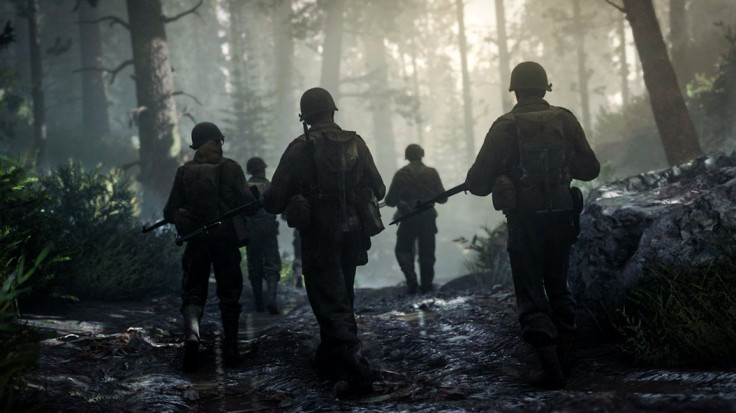Call Of Duty: WWII won’t leverage features found in a controversial matchmaking patent held by the game’s publishers at Activision. The news was confirmed by Sledgehammer Games Co-Founder Michael Condrey via Twitter Tuesday evening.
Thanks for taking a breath to gather the facts. I’ve never heard of this patent and that means it IS NOT in #CODWWII, period.
— M.Condrey @CODWWII (@MichaelCondrey) Oct. 17, 2017
Condrey's referring to a recently discovered document on the U.S. Patent Office website, which describes a brand new method of matchmaking in multiplayer games. The patent itself is predictably wordy, but here are the basics. It includes a system referred to as the “microtransaction 128 engine” that sets up lobbies to “arrange matches to influence game-related purchases.”
Certain scenarios that might take place, for example, are matching those without certain cosmetics with those who have them so they’ll be seen and desired. In other circumstances, those who own lots of DLC might be placed into bigger lobbies where they have the highest potential to influence others. They might also be put into situations where said DLC is used more frequently. Especially given the ongoing loot box and microtransaction debate gathering steam by the second, this is not a good look for the publisher. Activision has since issued a statement saying the patent was “an exploratory patent filed in 2015” that has “not been implemented in-game.” In case you needed a little extra assurance regarding Call Of Duty: WWII, though, take it from Condrey himself.
Of course, now that the patent has officially been granted, there’s nothing stopping it from being added to games like Call Of Duty: WWII after launch. More likely, however, is the idea that you might see systems like this employed in future Call Of Duty games or other popular Activision franchises.
As with most patents, however, there’s some complexity to the issue in that not everything about it should be seen as a negative. The document also includes mentions of “engine 122.” In short, the new matchmaking system focuses on a series of six variables that can be tweaked by game designers at any given time. Individual players are given “match scores” based on aspects like latency, skill, team roles, online friends and more. The weight of these aspects is determined by creators, but the general idea is that matchmaking becomes faster by tiering their importance. Those who want to be matched with friends, for example, are given a “soft reservation” in lobbies to make the process easier. If you need to complete a certain challenge based on your progression, matchmaking will hopefully better facilitate that.
It’s an interesting tradeoff for those who like to follow the everyday dealings of major publishers, but it’s not one we’ll seen in action in Call Of Duty: WWII. Quite possibly the most interesting part is, even if it is put in place, it’s likely not something gamers will actively notice if integrated properly.
Call Of Duty: WWII comes to PS4, Xbox One and PC Nov. 3.
How do you feel about microtransactions being linked to matchmaking? Would you be OK with some of these systems being used in Call Of Duty: WWII? Tell us in the comments section!
- Action-packed campaign
- Traditional multiplayer at its best
- A more welcoming Zombies mode
- Predictable story
- Small multiplayer maps
- Post-launch server issues



















